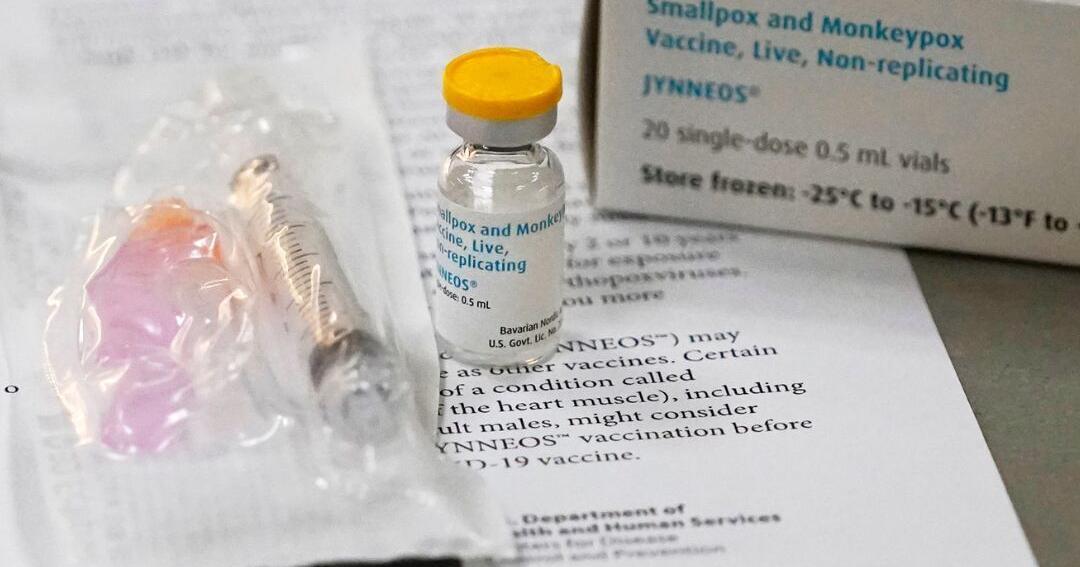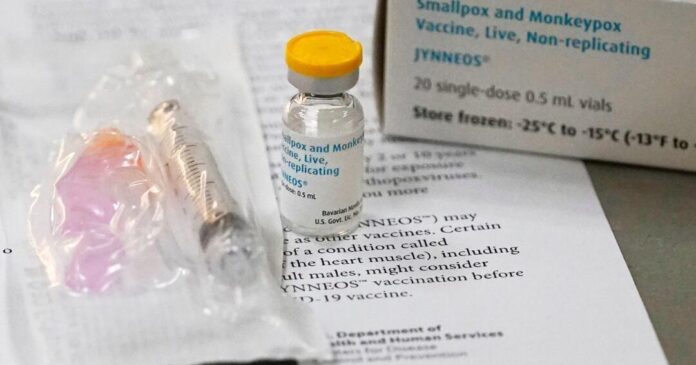
North Carolinians eligible for the monkeypox vaccine now include — as of Wednesday — women who have had sex with gay and bisexual men or transgender individuals, according to the N.C. Department of Health and Human Services.
The state said it is expanding vaccine eligibility to “people who have had sexual contact with gay, bisexual or other men who have sex with men, or transgender individuals in the past 90 days.”
DHHS said it is making the vaccine more widely available because of “evolving case trends and increasing supply.”
Monkeypox is a rare but potentially serious viral illness that typically involves flu-like symptoms, swelling of the lymph nodes and a rash that includes bumps that are filled with fluid before scabbing over.
The vaccine, known as Jynneos, requires two doses at least 28 days apart, and it takes 14 days after getting the second dose to reach maximum protection.
People are also reading…
People who have already been exposed to monkeypox but do not have symptoms can be vaccinated to prevent illness or help ensure milder symptoms if the shot is given no more than 14 days after exposure.
“While anyone can get monkeypox, nearly all of North Carolina’s cases are still in gay, bisexual or other men who have sex with men,” DHHS said.
As of Wednesday’s DHHS monkeypox update, there are 382 confirmed cases in the state, 99% of which involve men. Black men make up 68% of the people with confirmed cases.
The monkeypox case count in Forsyth County was at 14 on Sept. 1, according to county health director Joshua Swift.
People eligible for a vaccine also include:
*Anyone who had close contact in the past two weeks with someone who has been diagnosed with monkeypox
* Gay, bisexual or other men who have sex with men, or transgender individuals, who are sexually active
* People living with HIV, or taking medication to prevent HIV (PrEP); and
* People who were diagnosed with syphilis in the past 90 days.
DHHS said the new criteria “remove requirements that might have prevented some gay, bisexual or other MSM (men who have sex with men) from getting vaccinated.”
Around half of North Carolina’s cases are being diagnosed in people living with HIV, or in people who are taking medication to prevent HIV, or who have been recently diagnosed with a sexually transmitted infection.
As of Aug. 31, 11,420 vaccine doses have been administered across the state, and more doses are expected in the coming weeks. Swift said Forsyth health department had provided 612 vaccine doses as of Sept. 1.
Even though 68% of confirmed cases involve Black men, just 27% of the monkeypox vaccines to date have gone to Black men.
“It’s important to remember that anyone in any group of people can get monkeypox, which spreads mostly through prolonged skin-to-skin contact,” state Health Secretary Kody Kinsley said.
The Forsyth health department is not releasing any information about infected individuals, citing public-health privacy policies.
County public health officials are doing contact tracing to identity close contacts who may benefit from vaccination.
Swift said he is not aware of any monkeypox cases contracted by relatives of a patient in Forsyth.
In the Triad and northwest North Carolina, least one monkeypox case has been confirmed in Alamance, Davie, Davidson, Guilford, Randolph, Stokes and Surry counties.
The latest DHHS update listed Guilford with between 20 and 49 cases, while Alamance, Davie, Davidson, Randolph, Stokes and Surry have one to two cases.
Mecklenburg County is reported to have at least half of the state’s case count. DHHS says Mecklenburg as the only county with more than 50 cases.
Health care experts say that monkeypox has not led to significant hospitalizations or deaths. Swift said he is not aware of any hospital patients involving the 14 Forsyth cases.
“This particular strain of monkeypox, thankfully, has not … caused many deaths, and we have not seen a death in our health-care system and we have not hospitalized a patient with monkeypox,” said Dr. David Priest, an infectious diseases expert with Novant Health Inc.
“Most of the cases in our system have been milder clinically, and people have been able to recover at home.
“It doesn’t mean that people can’t have severe symptoms, with skin lesions that can be very painful.”
336-727-7376








